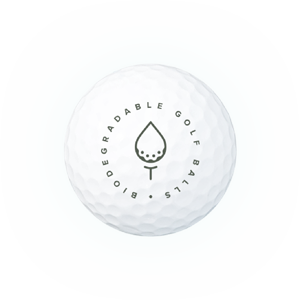How long do biodegradable golf balls take to dissolve?
Only about 2 weeks when submerged in water! If the water is warmer it may speed up the process & if it’s cold it may take a bit longer.
Will they dissolve on land?
Yup! Generally, they’ll take 6 months to a year but the biome they’re dissolving in will dictate how long it takes. If the region you’re in is very wet with lots of precipitation it may take a shorter amount of time. A hotter, drier climate may take longer.
What are biodegradable golf balls made of?
Our water-dissolving golf ball is made of primarily PVA, Glycerin, & Corn Starch. They’re non-toxic and will dissolve when placed in water.
Do they perform as well as professional use balls?
Unfortunately, the materials & chemicals used to create the traditional, non-biodegradable golf balls are what make them so bad for staying in our natural areas & waterways. With our current biodegradable golf ball technically, these hit at about 70% compared to a Pro V1.
Biodegradable golf balls are a ton of fun but are currently used for practice and are generally more of a novelty ball used in settings that are highly competitive.
Why are biodegradable golf balls so expensive?
Our biodegradable golf balls are very competitively priced, if not the best price on the market. We are always looking to create the best product at the cheapest price point for our customers.
Where to buy biodegradable golf balls?
Currently, we’re the world’s top manufacturer of biodegradable golf balls! Currently, you can purchase our product from our website www.biodegradablegolfballs.com, Amazon USA, Amazon Canada, & Walmart Canada.
What happens if an Animal eats one of these?
We highly recommend against any animals eating our golf balls. We suggest hitting these in areas where wildlife and animals will not consume these, as something this size, no matter what probably shouldn’t be eaten by an animal.
Do not eat these or allow animals to eat them. Although, these biodegradable golf balls are non-toxic and should not prove poisonous if consumed.
Why shouldn’t you hit traditional golf balls into bodies of water?
Traditional golf balls are generally made up of multiple cores & these cores are comprised of heavy, toxic metals such as polybutadiene, ionomer resins, & urethane polyurethane. These materials are highly impervious by nature and last decades if not centuries in our oceans and waterways.

